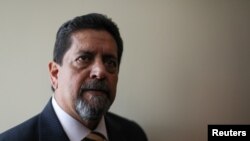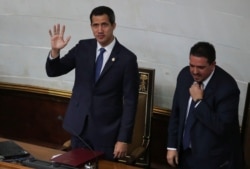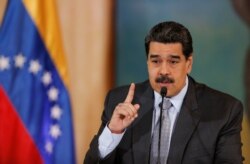During four months in a small military jail cell, Venezuela's Congress vice president scratched the days on a wall with a toothpick, held a hunger-strike, and made unlikely friends with two generals who have fallen foul of the socialist government.
"It was a pretty tough experience," opposition leader Edgar Zambrano, 64, told Reuters of his time in Cell 12A at the Fuerte Tiuna base in Caracas, where he was held, accused of treason against President Nicolas Maduro's administration. "We used a lot of mechanisms to survive."
In one of Venezuela's highest-profile arrests of recent times, intelligence agents intercepted Zambrano while he was driving away from his Democratic Action party headquarters on May 8.
A dawn appearance on a bridge beside Congress leader Juan Guaido - who invoked the constitution to assume the interim presidency in January - during a failed military uprising a week before was the catalyst for his detention.
After Zambrano refused to leave his vehicle, security agents towed him away with a truck. His driver, and three Congress workers who he said were getting a lift to an underground transport station, remain in jail.
"They are no danger to anyone, They were just obeying my order not to open the door," he said.
Though Zambrano was released two weeks ago after international pressure, his case is still open, meaning he has to report to a judge every 30 days and is barred from going abroad.
However, he has restarted work at the opposition-controlled National Assembly, a bastion of efforts to dislodge Maduro.
Even though Guaido is recognized by dozens of nations including the United States, Maduro, who succeeded late President Hugo Chavez, still controls Venezuela thanks to military loyalty and support from Russia and China.
'Solitude, Silence, Punishment'
In a lengthy reflection on his imprisonment, Zambrano said he was alone in a three-by-three meter (10-foot by 10-foot) cell, where he used a toothpick he happened to have in a pocket to mark the 135 days before he was set free. He refused food for 11 days and said he left prison 35 kg (77 lb) lighter, with stomach problems.
In Zambrano's cell block, there were just two others: former interior minister Miguel Rodriguez and former defense minister Raul Baduel, both one-time Chavez allies who became dissidents.
"Just imagine it! What could I feel between two top-level protagonists of the nation's disaster and misfortune? Me in the middle, living with these two actors on the right and the left, it was most strange.
"But necessity brought us together. And today they are serious people, critical of the government."
Zambrano said he became particularly close to Rodriguez, as they were in adjoining cells, synchronizing meals and exercises, and even praying aloud together. Adding to the irony, Rodriguez used to head the Sebin, the intelligence agency that arrested Zambrano.
Unlike other Maduro foes, who have alleged torture and other mistreatment in jail, Zambrano said he had no complaints about his guards, young men who treated him with courtesy.
"I was abused by the state, not by them," he said at his parliamentary office.
Citing South Africa and Chile as examples, the former union activist and lawyer said he believes dialogue between opposition and government is the only way to resolve Venezuela's crisis, even though that is an unpopular view among harder line activists who oppose negotiating with Maduro's "dictatorship."
A request to Venezuela's information ministry on Zambrano's case went answered.
Video footage showed him hugging a dissident soldier on the morning of the April 30 uprising. The Supreme Court accused him and other lawmakers of conspiracy, rebellion and treason - all of which he denied.
A father of two and devout Catholic, Zambrano has also been leading pilgrimages to shrines since his release.
"That was Edgar Zambrano's promise, because there amid the solitude, the silence of the night, and punishment of the bars, you cling onto faith," he said, eyes watering.







